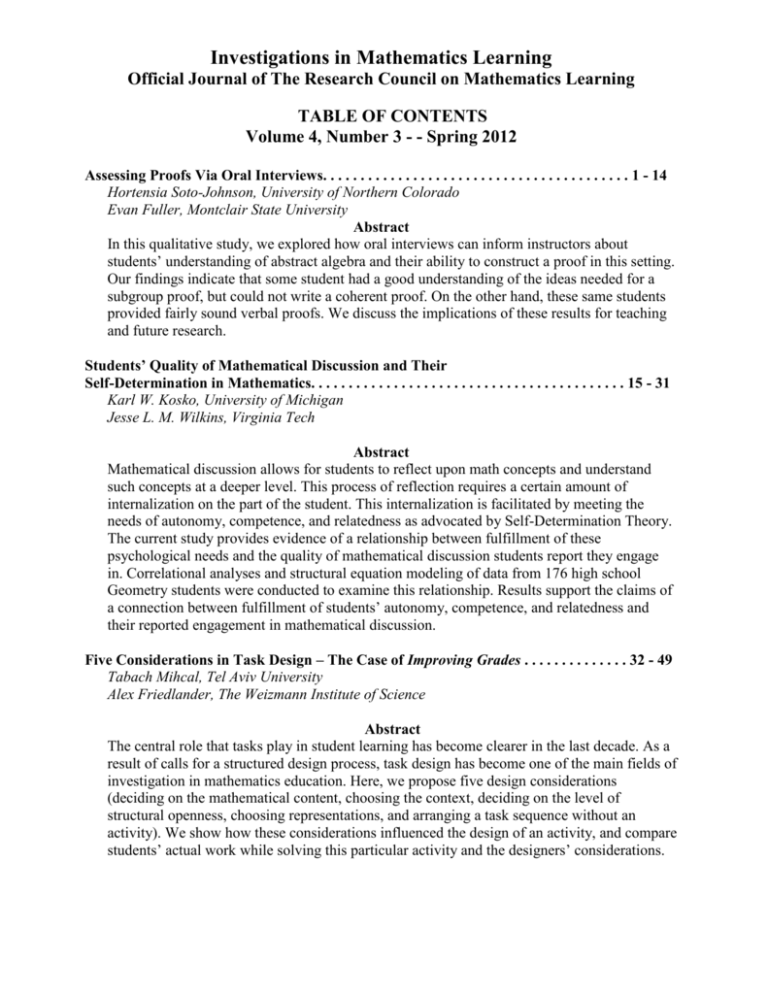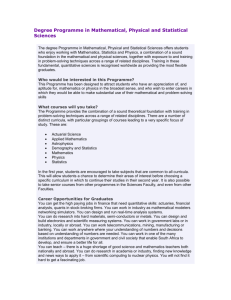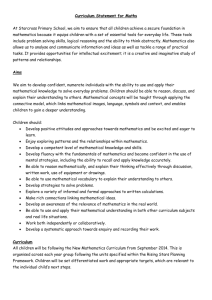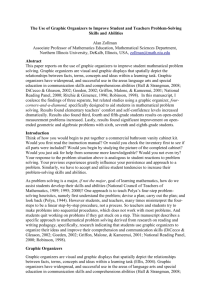Volume 4, Number 3 -
advertisement

Investigations in Mathematics Learning Official Journal of The Research Council on Mathematics Learning TABLE OF CONTENTS Volume 4, Number 3 - - Spring 2012 Assessing Proofs Via Oral Interviews. . . . . . . . . . . . . . . . . . . . . . . . . . . . . . . . . . . . . . . . . 1 - 14 Hortensia Soto-Johnson, University of Northern Colorado Evan Fuller, Montclair State University Abstract In this qualitative study, we explored how oral interviews can inform instructors about students’ understanding of abstract algebra and their ability to construct a proof in this setting. Our findings indicate that some student had a good understanding of the ideas needed for a subgroup proof, but could not write a coherent proof. On the other hand, these same students provided fairly sound verbal proofs. We discuss the implications of these results for teaching and future research. Students’ Quality of Mathematical Discussion and Their Self-Determination in Mathematics. . . . . . . . . . . . . . . . . . . . . . . . . . . . . . . . . . . . . . . . . . 15 - 31 Karl W. Kosko, University of Michigan Jesse L. M. Wilkins, Virginia Tech Abstract Mathematical discussion allows for students to reflect upon math concepts and understand such concepts at a deeper level. This process of reflection requires a certain amount of internalization on the part of the student. This internalization is facilitated by meeting the needs of autonomy, competence, and relatedness as advocated by Self-Determination Theory. The current study provides evidence of a relationship between fulfillment of these psychological needs and the quality of mathematical discussion students report they engage in. Correlational analyses and structural equation modeling of data from 176 high school Geometry students were conducted to examine this relationship. Results support the claims of a connection between fulfillment of students’ autonomy, competence, and relatedness and their reported engagement in mathematical discussion. Five Considerations in Task Design – The Case of Improving Grades . . . . . . . . . . . . . . 32 - 49 Tabach Mihcal, Tel Aviv University Alex Friedlander, The Weizmann Institute of Science Abstract The central role that tasks play in student learning has become clearer in the last decade. As a result of calls for a structured design process, task design has become one of the main fields of investigation in mathematics education. Here, we propose five design considerations (deciding on the mathematical content, choosing the context, deciding on the level of structural openness, choosing representations, and arranging a task sequence without an activity). We show how these considerations influenced the design of an activity, and compare students’ actual work while solving this particular activity and the designers’ considerations. Investigations in Mathematics Learning Official Journal of The Research Council on Mathematics Learning Write is Right: Using Graphic Organizers to Improve Student Mathematical Problem Solving . . . . . . . . . . . . . . . . . . . . . . . . . . . . . . . . . . . . . . . . . . . . . 50 - 60 Alan Zollman, Northern Illinois University Abstract Teachers have used graphic organizers successfully in teaching the writing process. This paper describes graphic organizers and their potential mathematics benefits for both students and teachers, elucidates a specific graphic organizer adaptation for mathematical problem solving, and discusses results using the four-corners-and-a-diamond graphic organizer with 186 inner-city, minority middle school students.








